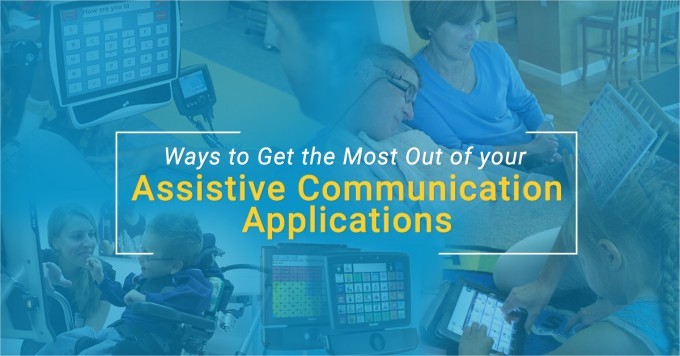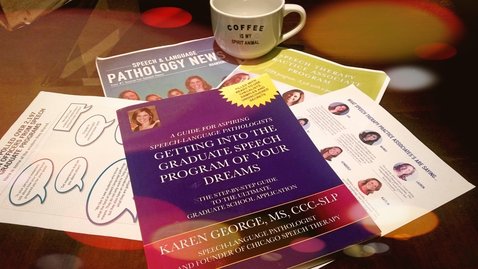|
I wanted to share this article that Euphony wrote because as a future SLP you may have clients on your caseload that are using Augmentative and Alternative Communication (AAC). Generalization and carryover of learned skills is so important and this article provided a good overview of different ways to effectively utilize AAC.
To get the latest information and news from Euphony Follow on Medium Today assistive communication applications extend well beyond clinical environments. They promote communication and grant SLPs, educators and caregivers with real-life solutions to support language development in real-life scenarios. No one argues the value of assistive communication applications. However, there’s a high-degree of variability across the spectrum of applications and how they’re used that limits the value they provide. The following dives into four important considerations to take into account when using assistive communication applications in order to maximize their impact and get the most out of them. Configure applications to use a language system that supports language development Many assistive communication applications today rely heavily upon text-to-speech functionality. Sometimes the audio used is pre-stored or “banked” whereas other times it is created dynamically on the fly with synthetic voices. In either case it’s imperative the applications are configured to support interactive communication which allows users to realize their potential as communicators. For most this means SNUG or spontaneous novel utterance generation. SNUG allows individuals to say anything they want at any time. It is based on access to individual words, word combinations, and commonly used phrases of language. Experts contend, assistive communication applications that are not configured to satisfy SNUG compromise human communicative potential and growth. Learning to say and combine individual words along with learning how to use word endings (i.e., such as ‘+s’ and ‘+ed’) enables users to go well-beyond pre-programmed phrases and sentences. It allows them to learn language and gives them the tools necessary to expand upon their communication skills as they go. Teach communication skills with assistive applications during real-life activities Once our assistive communication applications have been configured to foster language development, we then should use them under real-life scenarios. Nearly all SLPs and assistive technology professionals agree, the best teaching moments occur during real-life, meaningful activities that encourage the use of communication symbols to participate. For instance, meaningful activities include playing games, preparing food, eating meals, shopping, etc. Using communication applications to interact during these types of activities is particularly impactful. This is because they occur naturally and within everyday contexts that have reinforcing effects. Additionally, it’s important to always respond naturally when your child or student communicates using their device. For instance, if they say “game”, take out a game to play. If they “on” when the lights are off, turn the lights on. If you’re able to respond to their communication in legitimate ways, they will experience the impacts and results words can have. Use applications with text-to-speech voices that are authentic and fueled with emotion Maintaining natural exchanges through assistive communication applications is paramount. Not only is it important for exchanges to occur in natural contexts, it is also important for assistive communication applications to use voice outputs that sound natural. The quality and authenticity of voice outputs makes a tremendous impact upon trying to facilitate meaningful communication exchanges. Unfortunately today, many assistive communication applications use voice outputs that are robotic and unnatural sounding. There’s no emotion behind them. This makes it nearly impossible for a user to express their mood and frame of mind. As a result, inauthentic voice outputs significantly hamper understanding and limit the impact of communication exchanges (note: our new software product addresses this). Therefore, before selecting an assistive communication application, be sure to request voice samples from vendors to ensure the voice outputs are authentic and natural sounding. Identify the most important vocabulary relevant to your child and what motivates them to communicate Once acclimated with a particular application, pay close attention to the words that seem most important to your child or student. These initial words will give you a baseline to measure against as they progress. To do this effectively, introduce the application’s vocabulary in small, measured steps. Keep these initial exchanges fun and flexible. As you progress, build upon their successes and take note of the words they retain and continue to use as they advance. In closing When it comes to assistive communication applications, the ways they are used can make all the difference. SLPs, educators and caregivers can extend their value by using applications that are positioned to support language development. Additionally, upon identifying what motivates your child or student, the assistive communication applications you use should employ communication skills which correspond to real-life activities. And as assistive communication applications continue to evolve and improve (e.g., text-to-speech voices that are authentic and fueled with emotion), SLPs, educators and caregivers will have more flexibility, and thus, more opportunities to extend their overall impact.
0 Comments
Applying to Graduate School can be exciting, time consuming and overwhelming all at one time. It is important to have resources and support as you are navigating the process of applying for graduate schools.
Imagine a step by step guide to the ultimate graduate school application...Here it is… “A Guide for Aspiring Speech-Language Pathologists: Getting into the Graduate Speech Program of your Dreams” Who is the Author? Karen George, MS, CCC-SLP is the author of this wonderful resource book and the founder of Chicago Speech Therapy. Karen’s commitment to the field of Speech Language Pathology and to aspiring Speech Language Pathologists is evident by the many programs (i.e. Speech Therapy Practice Associate Program) that she has created along her journey. What are Other Aspiring SLPs are Saying? “I love the checklists in the book! They helped me to stay organized and focus on one task at a time. There are so many different things that need to be completed for graduate school applications, there is no way I would have remembered to do everything on time. The checklist makes applying to school a lot less scary.” “I just couldn’t be happier with this book. The book does all the work for you! Every chapter is helpful and is filled with information I needed to ace the application. Follow the instructions in the book and your application will write itself.” Why I Loved the Book? Checklists and Strategies: The theme of this book provides a wonderful foundation to feel supported throughout the whole process. Why recreate the wheel? A format and outline is provided right at your fingertips for you to take advantage of through the questions, checklists, tips and samples. Authentic and Genuine: The feel of this book’s format creates a personal connection to the process of applying to graduate school through real conversations, questions and experiences that occur along the way. Topics from “Recovering from a Bad Semester” to “The Re-applicant”. Case Studies: I loved this part, because it took real examples of a student’s profile (i.e. location, GPA, background information about the student, etc.) and provided their journey when applying for graduate school. Helpful Websites and Critical Resources to Help You Get into Graduate School Karen George took the time to compile survey information directly from admission directors from colleges and universities from all over the United States! Invest in your Future… “When I graduated, I secured my dream job as a CF and met Jen, my supervisor. Little did I know-it was my lucky day. This person would not only serve as my direct manager, but also as an invaluable source of mentoring, and guidance. Meeting Jen changed my life.” -Karen George- To have an invaluable tool like this book to add to your bookshelf may make the difference for you! Along my journey I had a mentor that took the time to invest in my future, Karen was fortunate to have a mentor to invest in her future, and now she is paying it forward by providing this resource. Thank you Karen for all you do within the Future SLPs community! To get a sneak peek of the first chapter of “A Guide for Aspiring Speech-Language Pathologists: Getting into the Graduate Speech Program of your Dreams” Stay Updated with the latest news: Facebook, Twitter, LinkedIn, YouTube |
Categories
All
Archives
November 2021
|
 This work is licensed under a Creative Commons Attribution-NonCommercial-NoDerivs 3.0 Unported License. |
© Copyright 2010-2020 futureslps.com All Rights Reserved Worldwide

